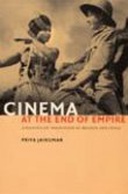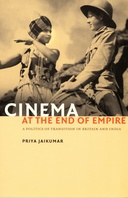Explore

How did the imperial logic underlying British and Indian film policy change with the British Empire’s loss of moral authority and political cohesion? Were British and Indian films of the 1930s and 1940s responsive to and responsible for such shifts? Cinema at the End of Empire illuminates this intertwined history of British and Indian cinema in the late colonial period. Challenging the rubric of national cinemas that dominates film studies, Priya Jaikumar contends that film aesthetics and film regulations were linked expressions of radical political transformations in a declining British empire and a nascent Indian nation. As she demonstrates, efforts to entice colonial film markets shaped Britain’s national film policies, and Indian responses to these initiatives altered the limits of colonial power in India.
This book is included in DOAB.
Why read this book? Have your say.
You must be logged in to comment.
Rights Information
Are you the author or publisher of this work? If so, you can claim it as yours by registering as an Unglue.it rights holder.Downloads
This work has been downloaded 267 times via unglue.it ebook links.
- 60 - pdf (CC BY-NC-ND) at OAPEN Library.
- 89 - pdf (CC BY-NC-ND) at Unglue.it.
Keywords
- British Motion pictures
- Cinema of India
- Film theory & criticism
- Film, TV & radio
- Films, cinema
- History
- Imperialism
- India
- KUnlatched
- Media and Communications
- modernism
- Motion picture industry
- Nationalism
- Performing Arts / Film & Video / History & Criticism
- The arts
- thema EDItEUR::A The Arts::AT Performing arts::ATF Films, cinema::ATFA Film history, theory or criticism
Links
DOI: 10.26530/oapen_625239Editions


